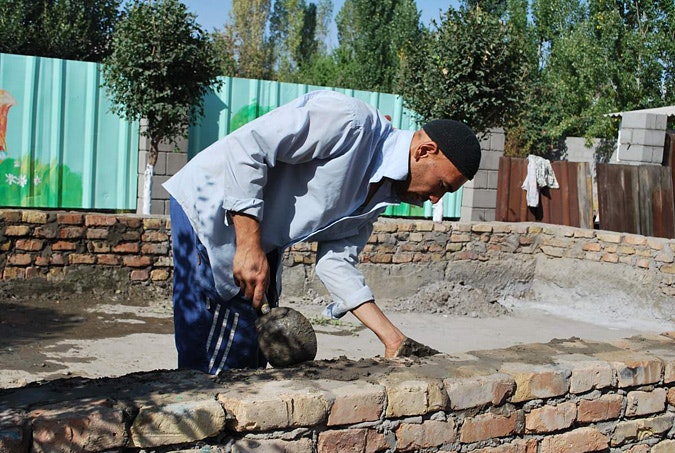Renewing Kyrgyzstan’s South
By Tynymgul Eshieva

This year the United Nations Development Program, with support from the Soros Foundation–Kyrgyzstan, launched 117 projects to help revitalize Kyrgyzstan’s South. The initiative was a continuation of UNDP projects from 2010 aimed at stabilizing income and providing aid to victims of the June 2010 conflict in Osh that left hundreds dead and thousands displaced.
Local authorities in Osh identified the scope of work, formed groups of workers, distributed payments, and provided security. UNDP provided the necessary materials, technical oversight, and conducted monitoring and evaluation of the projects. Groups of about 30 to 40 people at each building site received salaries of 300 Soms ($6.60) per day.
We traveled to the south to see the projects firsthand and meet with participants.
Osh: Peace through Restoration
Bermet Toktosunova, Director of Booruker Boarding House, took us to their courtyard where the residents were waiting for us. Booruker Boarding House is a unique, state-funded institution that houses 22 children and 30 elderly people. As part of the project, local authorities decided to revamp a children’s playground, clean the land around the boarding house, and build a cafeteria providing a warm place for meals.
Several schools were also renovated. A boarding school for blind and partially sighted children—the only school of its kind in the south—had its bath-house renovated; boiler and plumbing systems replaced; and new windows installed. Kyrgyz and Uzbeks, as well as people with disabilities, staff from the school, and students’ parents all helped with renovations. The organization Ravnak led the repair of Rudaki, a Russian-Uzbek secondary school. With a contribution of 670,000 Soms ($14,823) for the town’s department of education, they replaced the linoleum in all the classrooms, oversaw basic repairs, and installed a fence. The Medical School in Osh received new 1,030 meters of new pipes for the heating system in the library and dormitory.
Many villages in Osh benefited from the UNDP projects. Kyzyl-Meenet, a village that took in a large number of refugees after the June 2010 conflict, received a new water supply system and towers to help with shortages. Jany-Turmush, a village of 7,000 people, had its health clinic renovated—the heating and sewage system there had not functioned for more than 15 years. In Shankol, the kindergarten was retrofitted with a new kitchen and the playground was repaired. Local residents helped out including Damira Abdyzhalieva, a mother of three children. Damira receives a monthly allowance of 350 Soms per child—not even enough to buy good shoes. Her daughter attends the kindergarten in Shankol and Damira worked on the project not only to improve the school but also to help earn some money—a small, but significant contribution to her family's budget.
In nearby Arbyn, Gulnara Alimbekova, a local resident helped out on the reconstruction of a kindergarten, noting that “for me, 300 Soms per day is a good amount of money. My pension is only 2,200 Soms ($49). The land on which we grow potatoes and corn does not provide such money.” Aychurok Hakimzhanova, a grandmother in Achi, used the earnings from 28 days of work to purchase school supplies for her grandchildren and make provision for winter.
Jalalabad: New Playgrounds and Renovated Roads
In the ethnically diverse village of Lavdan-Kara, the UNDP project repaired a local bridge and road to connect the town to the main highway. Another diverse village, Blagoveschenka, had an existing kindergarten repaired—previously it was not a suitable place for children—and three new playgrounds built. The project created 35 jobs and residents busied themselves with installing a new fence, whitewashing buildings, restoring a swimming pool, and installing water heaters and pipes for drinking water. Parents contributed a total of 90,500 Soms ($2,002) and the project provided work for people like lkhom Aipov, a resident of Blagoveschenka and professional plasterer, who until the UNDP project had been unable to find work.
Prior to the UNDP project, the district of Dostuk did not have any playgrounds and children frequently played in the road. The construction of playgrounds in Dostuk employed 30 local workers and gives children a safe space to play. It is hoped that this shared public space will also help improve relations between residents of different nationalities.
The library in Jalalabad, founded in 1926 and home to 19,700 books, is the only specialized institution of its kind in the city. Although the reading room was very popular, the library itself was dilapidated and required urgent repairs. Funds were raised from selling old roofing tiles and new ceilings were created, walls were whitewashed, and now the citizens of Jalalabad have a renovated library.
Ibrahim Yuldashev, a carpenter by profession and the father of four children, decided to participate in a project in Jalalabad as he was struggling to find work. Ibrahim processed wooden planks to repair the gymnasium in the Babkina school. “There are few orders at home, and I decided to help.” Three of Ibrahim’s sons are now in Russia also working as carpenters. “As the Kyrgyz proverb says, ‘40 skills are not enough for a Kyrgyz man,’ and my kids can do everything.”
New classrooms, new playgrounds, clean water, new roads—it may seem easier to build all this than to restore peace, but the project's organizers hope that by bringing the people of southern Kyrgyzstan together for a joint purpose they can help foster new understandings. Reconstruction can be the first step toward reconciliation.
Tynymgul Eshieva is a Hubert Humphrey Fellow at Arizona State University and former public relations coordinator for the Soros Foundation–Kyrgyzstan.